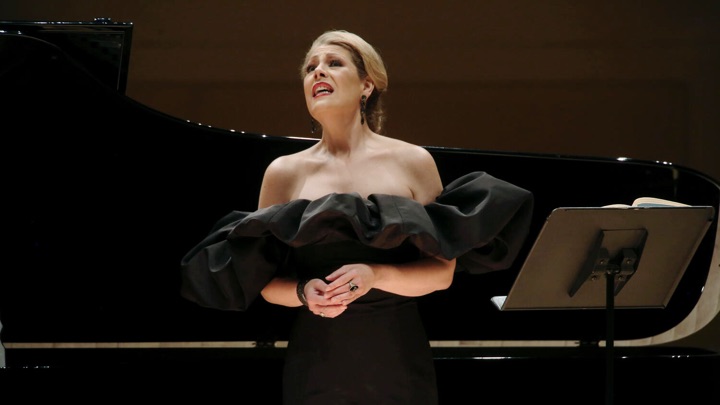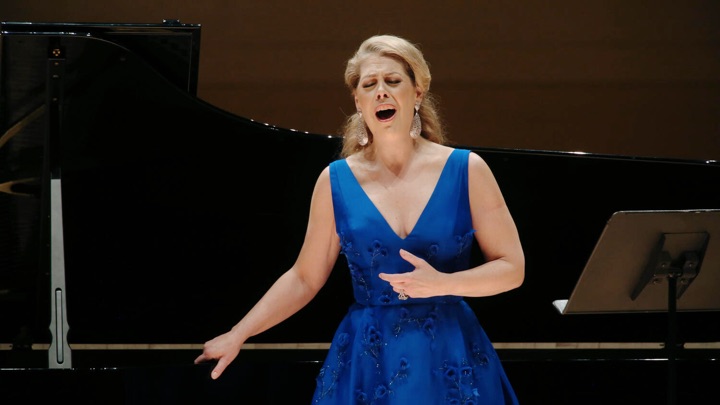

Genuine warmth flooded across the footlights in both directions. Radvanovsky eschewed the customary stuffiness of the recital format, often speaking directly to the audience and putting her selections in a highly personal context.
A group of French-language songs by Henri Duparc? A nod to her longtime residency in Canada. Rachmaninov romances? Taught to her by Dmitri Hvorostovsky, God bless his soul. “Piangero la sorte mia” from Giulio Cesare? The first aria to ever win her a singing competition.
The program’s subtitle, “From Loss to Love,” revealed an even greater investment in the material. Admirably frank and filterless, Radvanovsky made it known that 2022 has been a difficult year. Amid triumphs like her second opening night at the Metropolitan Opera, she has also been grieving the death of her mother and dealing with a divorce. Her linguistic framing is deliberate, though. Radvanovsky wants to remind people that strength, growth and resilience are byproducts of grief.
The best moments of the evening came when Radvanovsky engaged head-on with her emotionality. In particular, the world-premiere of “If I Had Known,” an art song composed by Jake Heggie to the soprano’s own text, was moving without turning maudlin.
Radvanovsky wrote the words in the aftermath of her mother’s passing, after a long struggle with dementia, and they wrenchingly capture the gradual decline of a once-vital woman. The text also explores the difficult reality of a child assuming the mantle of a parent.
Radvanovsky performed the brief song with deep feeling and a welcome tenderness, as pianist Anthony Manoli executed the edgy, arpeggiated accompaniment. We were told this is the first entry in a planned song-cycle exploring the seven stages of grief—the last of which is acceptance and hope.
The printed program’s final selection, “La mamma morta,” also suited Radvanovsky’s best qualities while making a certain thematic sense. The lyrics move from a swarm of self-pity to the warm glow of redemption, a shift that Radvanovsky made palpable. She displayed a mastery of piano effects and word painting, and her voluble voice sounded secure across its wide range. This sort of music is squarely in her comfort zone.
As much credit as Radvanovsky deserves for her serious musical choices—the two-and-a-half-hour concert included songs in five languages—it is clear that she is an opera singer, first and foremost. No single moment was as thrilling as her encore of “Io son l’umile ancella,” delivered with a stunning morbidezza you rarely hear from the over-the-hill sopranos who so often make this role their stock and trade. She should sing a full production while she still has all the goods in place, including the right temperament.
But elsewhere, despite her endearing character, the evening dragged. A suite of Lieder by Richard Strauss was marred by muddy German diction, and too many passages in “Allerseelen” and “Morgen!” were unnecessarily sung forte. The dexterous vocal line in Verdi’s “Stornello” seemed to cause some grief.
Radvanovsky is not the first soprano to take on Lizst’s Tre sonetti di Petrarca, but some slight pressure in her high notes occasionally marred the richness of her chest voice in these romantic selections. Dido’s Lament made for a strange, lugubrious curtain raiser, although Manoli brought a gorgeous transparency to the piano postlude.
The singing, overall, remains at an admirably high level, and the Carnegie crowd received her warmly. But when it comes to non-operatic appearances, Radvanovsky’s charm and ease on stage often trump the musical virtues. This includes her wardrobe: While she avoided large pieces of statement jewelry, as I’ve seen her wear in the past, her two dresses told a story in itself.
The slightly abstract black dress she donned for the first half of the concert gave way to a shimmering turquoise number in the second. Registering the audience taking note of her costume change, Radvanovsky couldn’t resist making her motives clear. “We’re happy now,” she laughed from the stage. Loss had become love.
Photos © 2022 Steve J. Sherman


























Comments